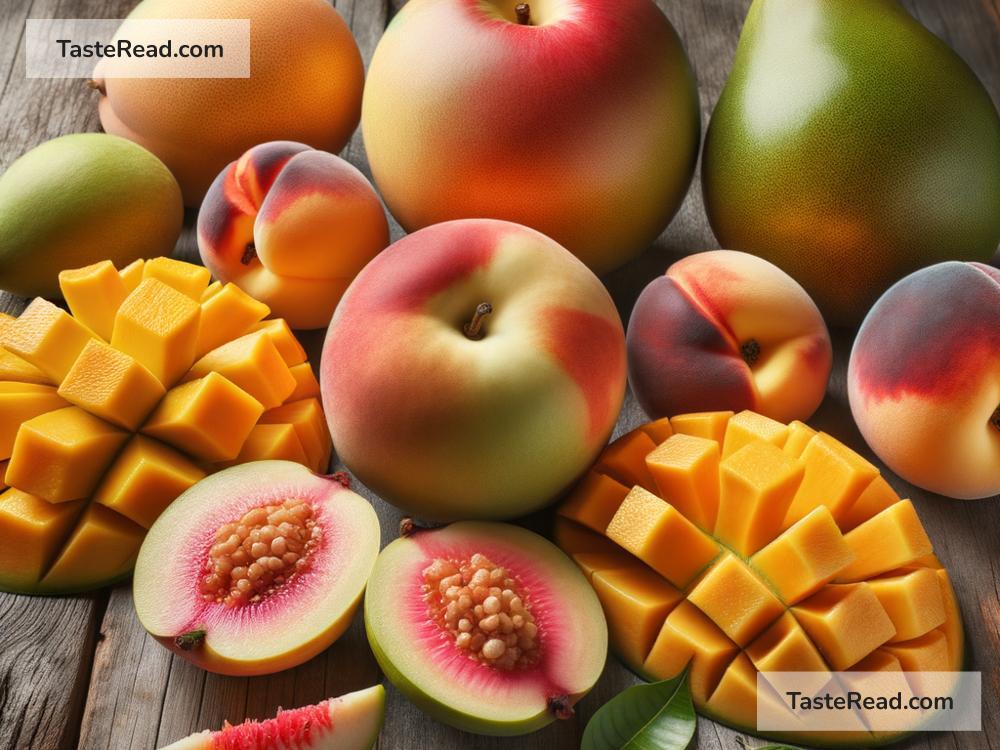Why Certain Fruits Have a Floral Taste After Ripening
Have you ever bitten into a perfectly ripe fruit, only to be surprised by a sweet, floral taste that wasn’t there before? Fruits like mangoes, peaches, and lychees are commonly known for having a distinctive floral flavor once they’re fully ripe. But why does this happen? Is it magic or science? Let’s explore the fascinating reasons behind this phenomenon.
The Role of Ripening
Fruits are nature’s way of spreading seeds. To attract animals and humans to eat them, fruits go through a process called ripening. This process makes the fruit sweeter, softer, and more colorful, signaling that it’s ready to be picked and consumed. Along with these changes, fruits also produce certain chemical compounds that affect their taste and aroma.
Ripening isn’t just about taste; it’s also about smell. Many ripe fruits have a strong fragrance, and that’s where the floral notes often come into play. These sweet, flowery aromas are created by natural chemicals in the fruit, which we’ll dive into next.
The Chemistry Behind Floral Flavors
The floral taste in fruits comes mainly from volatile organic compounds (VOCs). These are tiny molecules that evaporate easily into the air, creating distinct aromas that we can smell and taste. Different fruits produce different VOCs during ripening, giving each fruit its unique scent and flavor profile.
For example:
– Mangoes produce terpenes, which contribute to their tropical, slightly floral aroma.
– Peaches contain lactones and esters, which are responsible for their sweet and flowery flavor.
– Lychees have linalool, a compound commonly found in flowers like lavender.
You can think of VOCs as the fruit’s perfume. When fruits ripen, they release these aromatic compounds as a way to attract animals and insects to eat them, which helps spread their seeds. These compounds don’t just affect smell—they also impact how fruits taste on your tongue.
Why Do Some Fruits Taste Floral While Others Don’t?
Not all fruits develop floral flavors after ripening. Some, like apples and bananas, are sweet but not flowery. The reason lies in the types and amounts of VOCs each fruit produces. Fruits that contain more of the compounds linked to floral aromas—like esters, terpenes, and linalool—will taste more flowery than fruits that don’t.
Environmental factors also play a role. How a fruit is grown, harvested, and stored can influence the development of these flavorful compounds. For instance, fruits left to ripen naturally on the tree tend to have stronger, more complex flavors than fruits ripened artificially after being picked.
How Do Floral Flavors Affect How We Enjoy Fruits?
The floral taste in ripe fruits isn’t just a random feature; it’s a big part of their appeal. The delicate flowery notes add layers of complexity to the sweetness, making the fruit more enjoyable to eat.
For many people, the floral taste creates a sense of luxury or uniqueness. Fruits like lychees and mangosteens, which have pronounced floral flavors, are considered exotic and are often associated with special occasions or indulgence.
Chefs and food enthusiasts also use fruits with floral flavors creatively in recipes. Mangoes and peaches, for example, are often paired with herbs like basil or spices like cardamom in desserts, drinks, and salads to enhance their natural floral undertones.
Can You Taste the Floral Notes in Every Ripe Fruit?
Not everyone perceives floral flavors the same way. Our sense of taste and smell is highly individual, and some people may pick up on subtle floral notes more easily than others. Additionally, the ripeness of the fruit matters—an underripe fruit might not have developed enough VOCs yet, while an overripe fruit may taste overly strong or fermented.
If you want to experience the floral flavors in fruits, try eating them at peak ripeness. For fruits like mangoes, peaches, and lychees, this is usually when they feel slightly soft to the touch and smell fragrant.
Fun Fact: Fruits and Flowers Are Related
It’s no coincidence that some fruits taste as though they’re infused with flowers. Botanically speaking, fruits are the mature ovaries of flowering plants. So, the connection between fruits and floral flavors is deeply rooted in nature. The compounds responsible for a flower’s scent, like linalool and terpenes, often end up in the fruit as well.
Conclusion
The floral taste in ripe fruits is a result of nature’s clever design. Through the production of aromatic compounds, fruits become irresistible to eat, ensuring their seeds are carried far and wide. These delicate, perfume-like flavors make certain fruits stand out and offer an extra layer of enjoyment when we eat them.
Next time you bite into a ripe mango or peach, take a moment to savor the subtle floral notes. They’re a reminder of the intricate chemistry and beauty of nature—and a testament to why fruit is such a simple yet extraordinary treat.


